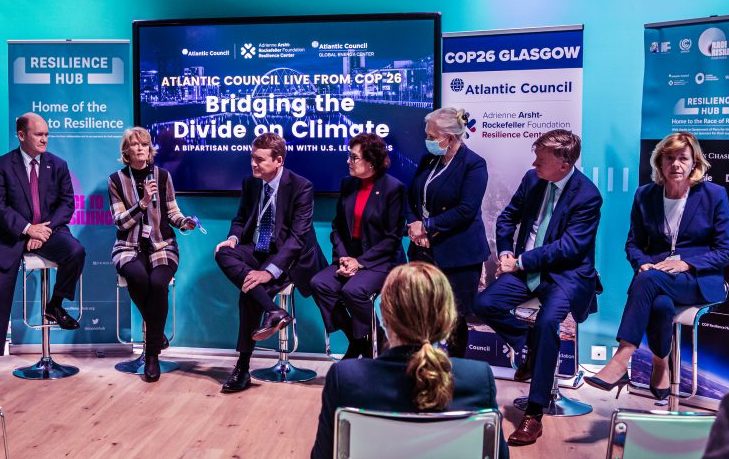Former president Barack Obama was not the only important American to make a contribution to the Glasgow COP. His rallying call to the world to take seriously the multiple threats from global warming followed a session at the Resilience Hub in which – for the first time at a COP – a bi-partisan group of members of Congress said they were backing a resiliency planning bill for the United States.
This was seen as a significant step forward after widespread climate change scepticism previously among politicians and industry and because in most countries tackling the climate emergency transcends party politics.
Opening the session ‘Bridging the Divide on Climate – A Bipartisan Conversation with US Legislators’, the Democrat Senator Chris Coons from Delaware announced that he and colleagues from both parties were working together on the resiliency planning bill. As a sign of intent, he noted that the recently approved infrastructure bill included $43 billion towards climate resilience.
In all, 14 congressional leaders joined the event and agreed that the climate is changing, human action is contributing to it and the world needs sustainable solutions.
Commenting on the conversation, Kathy Baughman McLeod, on behalf of the host organisations, said: ‘For the first time ever in the COP world, momentum for climate progress is not only being measured by metric tons of carbon and finance deployed. It’s being measured by human life.’
The event was presented by the Atlantic Council’s Adrienne Arsht-Rockefeller Foundation Resilience Center and the Global Energy Center. Katherine Walla, assistant director of editorial at the Atlantic Council, wrote this blog which we are pleased to reprint here.
Blog by Katherine Walla
From fires in Oregon to flooding in the Midwest and Northeast, severe weather events are impacting Americans nationwide. And that’s why climate change is becoming an important cause on both sides of the political aisle, according to members of Congress from both parties speaking at an event put on in the Resilience in Glasgow.
As five-hundred-year or thousand-year severe weather events become more common in Wisconsin, ‘there’s no time to wait,’ said US Senator Tammy Baldwin (D-WI). US Representative John Curtis (R-UT) pointed out that a bipartisan approach to climate is possible, but that Republicans ‘needed help to get at the table’. He formed the Conservative Climate Caucus as part of an effort to make clear that ‘Republicans care deeply about this earth and about stewardship,’ he said.
The optimism in the room came in part from Friday night’s US House passage of a one-trillion-dollar infrastructure bill, which as Senator Chris Coons (D-DE) pointed out, includes substantial green investments: $73 billion for energy efficiency, deployment, and innovation; and $43 billion for climate resilience efforts.
One issue that’s always bipartisan is jobs. Senator Lisa Murkowski (R-AK), a supporter of the infrastructure package, said that once President Joe Biden signs it into law,’“we’ve got to get those jobs going, whether it is in the space of hydro or renewables or grid modernisation. Let’s get moving with that infrastructure bill.’
Of course this bill alone won’t tame climate change, but the members of Congress in Glasgow spied more opportunities to break through Washington gridlock, given that, as Global Energy Center Director Randy Bell put it, ‘Energy innovation has become a bipartisan opportunity for climate action in the United States.’ Murkowski agreed, saying that cooperation is ‘going to come with advancements in technology… [and] efficiency’. For Senator John Hickenlooper (D-CO), that opportunity for cooperation will come in creating ‘a fee on carbon emissions’.
Bipartisanship is important, said Senator Michael Bennet (D-CO), not just because of the urgency of the climate crisis—but so that the solutions can be durable and ‘last from one administration to the next’. In implementing these solutions and while fuelling the energy transition, Bennet said leaders will have to ensure that they listen to their constituents and support workers in the energy industry who may lose their jobs and need to change fields. ‘It can’t be an afterthought; it can’t be something in the corner,’ he said.
Even as all eyes are on Washington, states can take the lead by deploying natural solutions to climate change. For example, Senator Jeff Merkley (D-OR) explained how, with the help of natural systems and techniques like forest restoration, ‘there’s a lot we can do to make forests more resilient to fire’. Senator Debbie Stabenow (D-MI) pointed to agricultural innovations, including ‘different kinds of feed so that animals [on farms] are producing less methane’, later adding ‘we should focus on soil as much as oil.’ Baldwin hailed the innovation of farmers who are using environmentally friendly techniques like no-till or growing cover crops, while Senator Kirsten Gillibrand (D-NY) spoke about how growing oysters and grasses in the ocean can help prevent flooding.
From the federal to the state to the local level, Gillibrand noted how young people in particular are impressing climate urgency upon lawmakers—and helping create the political conditions for bipartisan action. ‘The globe is heating up, and it’s destroying things they care about,’ she said. ‘Their futures are on the line.’
Picture: US legislators taking part in the Bridging the Divide conversation

